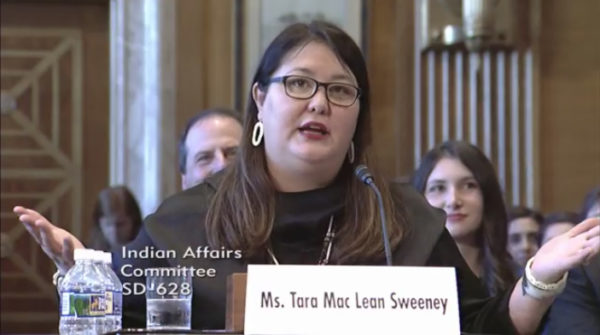
- Details
- By Levi Rickert
WASHINGTON — Tensions between Indian Country and the Trump administration have reached unprecedented heights this week, as leading national American Indian groups called for the ouster of the country’s top official for Indian affairs.
In a three-page letter addressed to Interior Secretary David Bernhardt, five leading American Indian organizations called for the immediate removal of Assistant Secretary for Indian Affairs (AS-IA) Tara MacLean Sweeney from her post at the U.S. Department of the Interior.
The letter is signed by presidents of Association on American Indians Affairs, Great Plains Tribal Chairman’s Association, Midwest Alliance of Sovereign Tribes, National Congress of American Indians and the USET Sovereignty Protection Fund. The request comes after several months of frustration with Sweeney’s failures “to honor and uphold the federal government’s trust obligation to Tribal Nations.”
The letter also comes two weeks after the Office of Inspector General (OIG) for the DOI launched an ethics probe into a senior DOI official’s handling of $8 billion in CARES Act funding for tribes, as well as allegations that the DOI improperly released sensitive tribal government information. The unnamed official is widely believed to be Sweeney.
An Alaska Native, Sweeney is a former oil and gas lobbyist who later worked for one of Alaska’s largest native corporations, Arctic Slope Regional Corporation (ASRC). She was paid $1,086,675 by ASRC in 2017 and the first month of 2018, according to a federal financial disclosure report filed in January 2018 when she was being considered for the post as Asst. Secretary.
The letter mentions four specific areas the organization’s leaders feel Sweeney has not fulfilled her responsibilities as the trustee to tribes.
First, the letter cites Sweeney signing the decision, on her first day in office, to reverse the Department of the Interior’s action to acquire trust lands and set aside a reservation for the Mashpee Wampanoag Tribe.
Sweeney later oversaw DOI’s withdrawal from litigation in support of the Mashpee’s right to lands and, the letter writes, just days after the United States declared COVID-19 a national pandemic, and before the court had issued any decision requiring Interior to take Mashpee’s lands out of trust status – Sweeney took actions to disestablish Mashpee’s reservation entirely. This type of unilateral assault on Tribal lands has not occurred since the Termination Era more than 60 years ago.”
The second area mentions the fact Sweeney failed to protect and preserve lands rights of the Tohono O’odham Nation in the recent desecration of unmarked ancestral burial sites at the southern border of the United States that is being partially installed to fulfill a 2016 presidential campaign promise of President Trump to build a wall.
The third area cited in the letter involves Sweeney’s recent handling of her input into allocation of CARES Act funds to tribes.
“Sweeney unethically sought to divert emergency Tribal government resources to state-chartered, for-profit corporations, including her former employer and her husband’s client – a wealthy Alaska Native corporation for which he is a registered lobbyist,” the letter said.
The fourth argument for her removal in the letter is the Interior Department’s denial of “Alaska Native villages their statutory and regulatory rights to acquire lands in trust via the Alaska Indian Reorganization Act and its incorporation of the Indian Reorganization Act of 1934.”
The presidents of the five organizations that signed the letter make it clear that the call for Sweeney’s ouster comes after much thought, deliberation and some regret.
“Our organizations regret that circumstances require our insistence on AS-IA Sweeney’s removal from office, as many of us supported her nomination and had high expectations for her service. But we owe it to our member Tribal Nations, our children, and our ancestors to ensure that all AS-IAs uphold and faithfully execute the duties of the office in a way that advances the authorities, capabilities and interests of Tribal Nations,” the letter writes.
"The Department has complete confidence in Assistant Secretary Sweeney. She is steadfast in upholding her ethical requirements and has continually fought for and worked alongside all American Indians and Alaska Natives," a spokesperson for the Interior Department commented to Native News Online in an email on Saturday evening.
More Stories Like This
Native News Weekly (August 25, 2024): D.C. BriefsNavajo Nation Mourns the Passing of Former Vice President Rex Lee Jim
Deb Haaland Earns Endorsement From Communications Workers of America Local 7076
University Soccer Standout Leads by Example
Two Native Americans Named to Democratic Congressional Campaign Committee's“Red to Blue” Program
Help us defend tribal sovereignty.
At Native News Online, our mission is rooted in telling the stories that strengthen sovereignty and uplift Indigenous voices — not just at year’s end, but every single day.
Because of your generosity last year, we were able to keep our reporters on the ground in tribal communities, at national gatherings and in the halls of Congress — covering the issues that matter most to Indian Country: sovereignty, culture, education, health and economic opportunity.
That support sustained us through a tough year in 2025. Now, as we look to the year ahead, we need your help right now to ensure warrior journalism remains strong — reporting that defends tribal sovereignty, amplifies Native truth, and holds power accountable.
 The stakes couldn't be higher. Your support keeps Native voices heard, Native stories told and Native sovereignty defended.
The stakes couldn't be higher. Your support keeps Native voices heard, Native stories told and Native sovereignty defended.
Stand with Warrior Journalism today.
Levi Rickert (Potawatomi), Editor & Publisher

